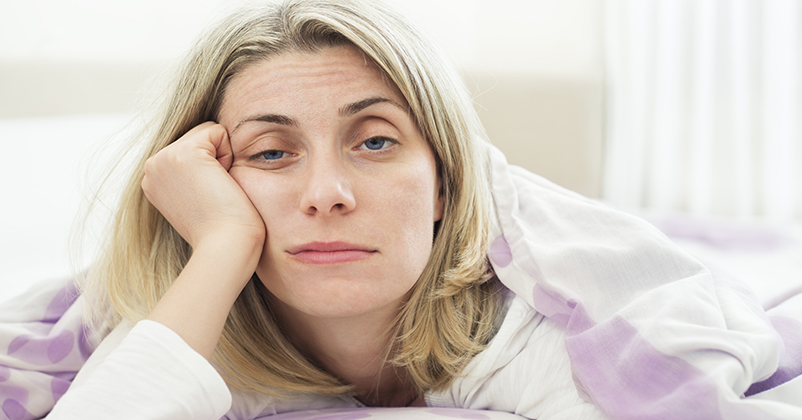
So many things take a cut of your time: work, commute, kids, chores, friends…it’s not easy to wedge in time for yourself, too. When your day is packed beyond full, what gets squeezed? Sleep. The busier you get, the more likely you’ll push off bedtime to meet other demands; after all, isn’t sleeping kind of a waste? Our culture tends to portray rest as a lazy luxury. As a result, more than a third of American adults get less than 7 hours of sleep on weeknights.[1]
The truth is just the opposite. With new observational and imaging techniques, scientists are now demonstrating how crucial sleep is for our mental and physical well-being. Maslow’s famous Hierarchy of Needs says that sleep is one of our most basic physiological needs, right alongside air, food, and shelter, and he was right.[2] Sleep is roughly 36% of your biology for a good reason—when you sacrifice your sleep, you’re really sacrificing your health.[3]
Sacrifice Your Sleep and Everything Can Go Wrong
Your body needs adequate sleep—7 to 9 hours a night, generally—to maintain its amazing balance of healthy living processes keyed to waking and sleeping.[4] What happens when you sacrifice your sleep?
- Buildup of toxins in the brain: Sleep gives the brain a chance to do its housekeeping. Recent research has shown how brain cells shrink during sleep, opening up the gaps between neurons and allowing fluid to wash the tissues clean of cellular byproducts and toxic proteins. This may be one of the reasons we experience such strong effects from a lost night’s sleep—indeed, it may be the “compelling biological reason” for sleep across species. Without sleep, harmful proteins and cell wastes build up in the brain, which may play a role in disorders like Alzheimer’s and Parkinson’s.[5]
- Abnormal gene activity: Researchers used blood tests to reveal that the normal circadian activity of hundreds of genes was altered when people's sleep was cut to less than 6 hours a day for a week. Researcher Colin Smith of the University of Surrey told the BBC that the sleep deficit resulted in dramatic, detrimental changes in the immune system and how the body responds to damage and stress. “Clearly sleep is critical to rebuilding the body and maintaining a functional state,” he said. “If we can't actually replenish and replace new cells, then that's going to lead to degenerative diseases."[6]
- Elevated stress: Chronic sleep deprivation creates sustained stress reactions that take a sneaky toll on your body, suppressing immunity and increasing the likelihood of serious metabolic diseases.[3]
- Weight gain: When you’re seriously fatigued, you crave more food, especially carbs and sugar—and ironically, that’s exactly when your body has a harder time actually metabolizing the calories you consume. The irony adds up: If you’re getting just 5 hours (or less) of sleep a night, you’re 50% more likely to be obese.[3]
- Tendency toward mental illness: Researchers have found a physical link in the brain between sleep and mental illness.[3] A disruption of the genes that are important for normal sleep can predispose you to developing a mental illness, or make an existing illness worse. Sleep disturbances often appear long before diagnosis in some conditions, such as bipolar disorder; chronic sleep issues are also linked to depression, schizophrenia, and dementia.
Losing sleep forces your body to fight the resulting imbalances in ways you can’t see…yet may have to pay for in the long term.
Your Brain Can Steal Sleep (but That’s Not Good)
Scientists have known for a long time that lack of sleep affects physical reflexes and fine motor skills, along with perception and judgment; one study even demonstrated that sleep-deprived subjects were more likely to believe that they were right when they were actually wrong.[7]
New imaging techniques are now allowing researchers to see how, if you don’t give it adequate rest, your brain can actually steal what it needs—initiating brief, involuntary shutdowns called microsleeps in tiny regions of the brain, often without you even realizing it. These small lapses can have huge consequences. Fatigue contributes to about 80,000 car wrecks a year in the United States (1,000 of which are typically fatal).[1] Investigators have concluded that poor judgment and attention lapses from extreme chronic fatigue played a significant role at Chernobyl and in the Challenger shuttle tragedy, as well.[3]
The Biggest Loss of All: Your Memory
Worst of all, sleep deprivation can rob your brain of one of its most precious gifts: your ability to learn and remember.
Sleep affects learning and memory in 2 ways:
- Sleep deprivation impairs your ability to focus on learning new things; and
- Your brain needs sleep to consolidate memories so you can recall them later.[7]
Learning or experiencing new things, as well as recalling them later, happens when you’re awake, of course—but without sleep, you’ll have a much harder time remembering them when you want to.[7]
“Sleep seems to be a privileged time when the brain goes back through recent memories and decides both what to keep and what not to keep,” Harvard sleep expert Dr. Robert Stickgold explains in the National Institutes of Health newsletter, News in Health. “During a night of sleep, some memories are strengthened.”[8]
That strengthening is consolidation. In the first half of the night, during a deep stage called Slow Wave Sleep, the brain replays memories from the day and sends those worth keeping into long-term storage. In the second half of the night, Rapid Eye Movement Sleep—also known as REM, the most active or dreaming stage—apparently links related memories together, sometimes in unexpected ways. This may be why a good night’s sleep can contribute to effective problem solving: sleep gives the brain time to find and build more distant, more inventive associations.[9]
“It’s perhaps no surprise that you have never been told to stay awake on a problem,” neuroscientist Matthew Walker from the University of California, Berkeley, tells the Society for Neuroscience. “We know that you should sleep on it, and we now have empirical scientific evidence that sleep serves this creative, associative process.”[9]
Sleep patterns tend to change as we age; the crucial deep memory-strengthening stages of sleep start to decline in our late 30s. UC Berkeley’s Walker found that adults 60 years and older had a 70% loss of deep sleep compared to young adults 18-25. The older people also had a harder time remembering things the next day; Walker linked the memory impairments to reductions in deep sleep. The good news is that “while we have limited medical treatments for memory impairment in aging, sleep actually is a potentially treatable target,” he says. “By restoring sleep, it might be possible to improve memory in older people.”[6]
When You Snooze, You Don’t Lose: 6 Tips for Good Sleep
You know how it feels: you’re just not yourself when you haven’t slept. Getting enough sleep is just as important to your health as eating right and exercising regularly. Here are some ways to ensure that every night is a good night:
- Go to bed and wake up at the same time every day. It’s a myth that you can “make up sleep”—too much sleep is just as disruptive to your natural circadian rhythms as too little.[10] A consistent schedule will help you get in the habit of getting the right amount of sleep for you.
- Establish a bedtime ritual. A routine signals your body and your mind that it’s time to relax; it can really help if you have trouble “turning off” at the end of the day.
- Make your bedroom a restful haven. Most people sleep better in a cool, dark room. If you need to block outside noises, use a white-noise machine (or app on your phone) instead of music.
- Banish screens from bed. Aside from the effects of exciting or stressful content, the blue-tinted light of your device stimulates your brain and makes it harder to fall asleep.
- Avoid caffeine, alcohol, or nicotine within a few hours of bedtime. Caffeine and nicotine are both stimulants that make it hard to fall or stay asleep. Alcohol, normally a depressant, actually sedates you and interferes with your normal sleep cycles.
- Exercise—but not necessarily right before bed. While the science is very clear about the benefits of exercise for your health, the same clarity doesn’t exist around the question of how long before bedtime you should do it. People who exercise regularly report that they sleep better, but it might be a good idea to finish a very strenuous workout at least a couple of hours before you start trying to wind down for the night.
Stop sacrificing your sleep. It’s no waste of time; it’s a vital, holistic health practice that supports your body’s natural cycles that re-balance, repair, and rejuvenate. Get a good night’s sleep, and you kick-start the next day with all of your powers; shortchange your sleep, and you risk everything that your brain and body provide.
Notes
1. Christopher Ingraham, “Americans are trading sleep for work, and it’s literally killing us,” WashingtonPost.com, December 15, 2014.
2. Saul McLeod, “Maslow's Hierarchy of Needs,” SimplyPsychology.com, 2014.
3. Russell Foster, “Why Do We Sleep?” from TED Global 2013, TED.com, June 2013.
4. Travis Bradberry, “Lack of Sleep Is Killing You and Your Career,” Inc.com, Jan. 20, 2015.
5. Meeri Kim, “Brains flush toxic waste in sleep, including Alzheimer’s-linked protein, study of mice finds,” WashingtonPost.com, Oct. 19, 2013. Lulu Xie et al., “Sleep Drives Metabolite Clearance from the Adult Brain,” Science, Oct. 18, 2013: Vol. 342 no. 6156, DOI: 10.1126/science.1241224.
6. James Gallagher, “Bad Sleep ‘Dramatically’ Alters Body,” BBC.com, Feb. 26, 2013. Carla S. Möller-Levet and others, “Effects of insufficient sleep on circadian rhythmicity and expression amplitude of the human blood transcriptome,” PNAS, March 2013: Vol. 110 no. 12, doi: 10.1073/pnas.1217154110.
7. WebMD.com, “Sleep Deprivation and Memory Loss,” Aug. 30, 2015.
8. National Institutes of Health, “Sleep On It: How Snoozing Strengthens Memories,” in News in Health, April 2013.
9. Susan Gaidos, “The Secret to Memory? A Good Night’s Sleep,” BrainFacts.org Society for Neuroscience, Mar. 3, 2015.
10. WebMD.com, “Physical Side Effects of Oversleeping,” Jan. 8, 2016. Howard LeWine, MD, “Too little sleep, and too much, affect memory,” Harvard Health Blog, Oct. 29, 2015.









